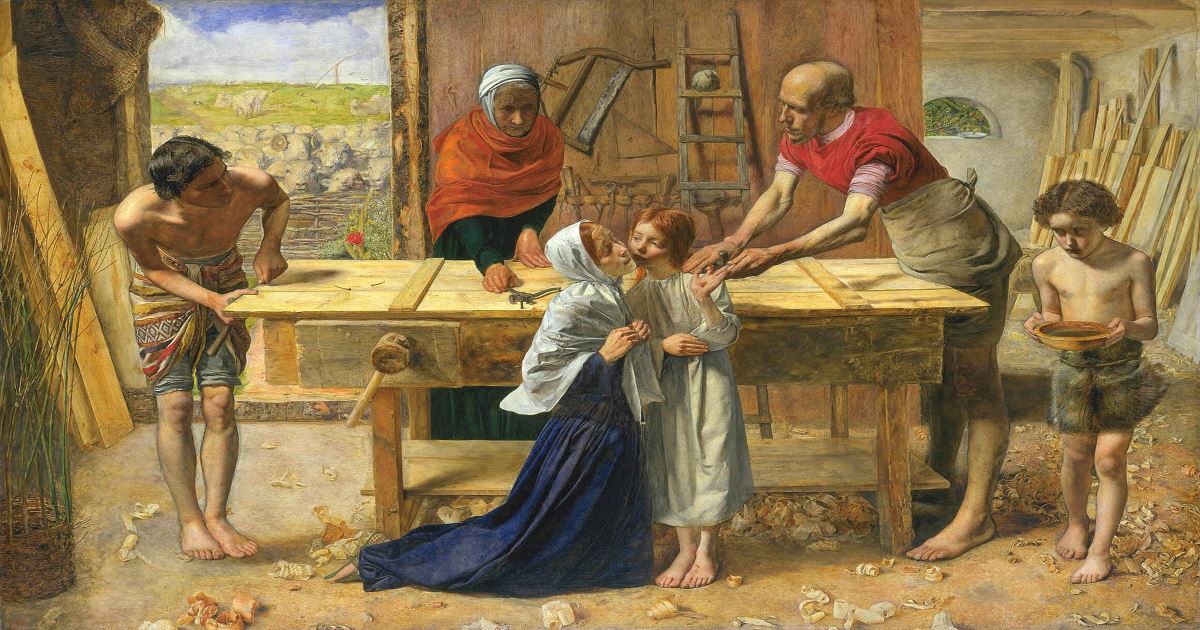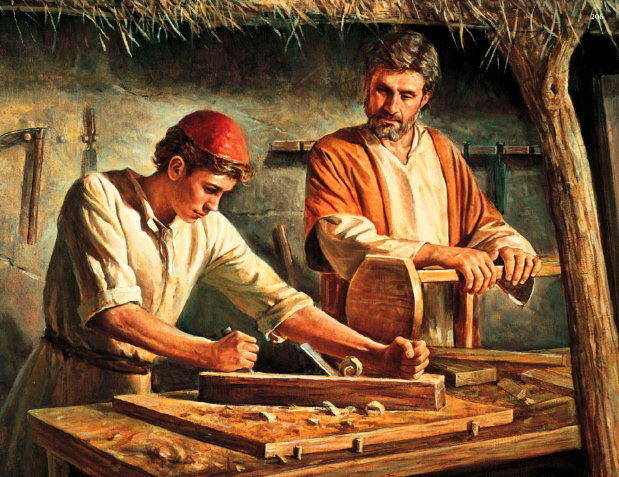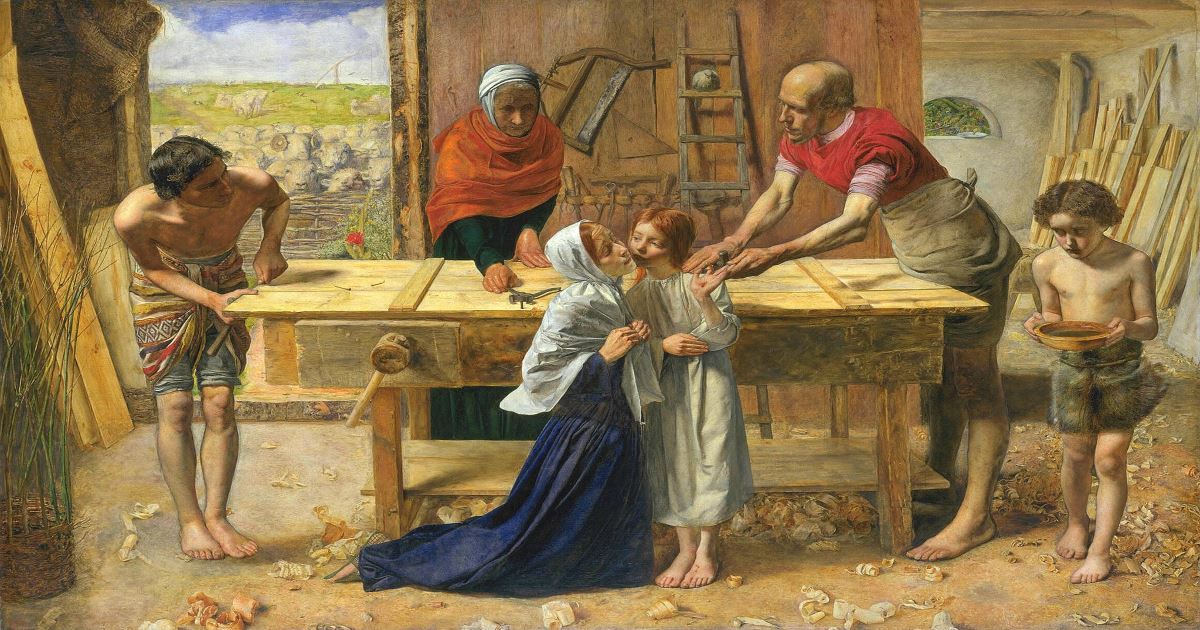Curious about the carpentry skills of Jesus? In this article, we’ll explore what carpentry work Jesus may have done. Carpentry was an important trade in ancient times, and it’s fascinating to delve into the possibilities of Jesus’ involvement in this craft. So, let’s dive in and uncover the intriguing world of Jesus’ carpentry!
Now, you might be wondering, what makes this topic so intriguing? Well, the fact that Jesus is known as the Son of God, yet also embraced the humble profession of carpentry, adds a layer of mystery and wonder to his life. Discovering the type of carpentry he performed and the skills he possessed brings us closer to understanding his early years.
So, fasten your seatbelts and join me as we journey back in time to explore the carpentry work of Jesus. Delve into the world of saws, chisels, and woodworking techniques to uncover the hidden story of Jesus, the carpenter. Are you ready? Let’s get started!

The Carpentry of Jesus: Uncovering His Craftmanship
In the realm of biblical figures, few are as revered and influential as Jesus Christ. From his teachings to his miracles, Jesus has left an indelible mark on human history. However, there is one aspect of his life that often goes overlooked – his carpentry. Before embarking on his ministry, Jesus honed his skills as a master carpenter. This article delves into the world of Jesus’ carpentry, exploring the kind of work he likely did and the significance it holds within his life and teachings.
Jesus’ Carpentry and Its Cultural Context
Before delving into the specifics of Jesus’ carpentry, it is important to understand the cultural context in which he operated. During the time of Jesus, carpentry was an essential trade in the region, particularly in the town of Nazareth where he grew up. As a carpenter, Jesus would have worked primarily with wood, using a variety of tools and techniques to craft functional and intricate pieces.
1. The Nature of Jesus’ Carpentry
Jesus’ carpentry likely included a wide range of tasks, from building everyday household items to constructing larger structures. The scarcity of written records from that time limits our knowledge of his exact projects, but we can draw insights from the cultural practices of the era.
In a town like Nazareth, where houses were predominantly constructed using stone, Jesus would have been skilled in the art of wooden joinery. This involved creating doors, windows, and roofs, as well as assembling furniture like tables, chairs, and beds. His craftsmanship would have been highly valued, ensuring that his work was sturdy, durable, and aesthetically pleasing.
Jesus would have also been familiar with the construction of agricultural tools used in the predominantly agricultural society of his time. Plows, yokes, and axes would have been indispensable tools that Jesus crafted with precision and care. His mastery of carpentry extended beyond the confines of the home, reaching into the fields where he would have created tools to aid in the laborious tasks of farming and tending to livestock.
2. The Significance of Jesus’ Carpentry
The carpentry skills of Jesus hold significant symbolic and spiritual value. The act of working with one’s hands, shaping and transforming raw materials into functional objects, carries a deeper meaning. Jesus’ work as a carpenter before his ministry highlights the importance of labor and creativity, and the value of honest, diligent work. It showcases the divine purpose in everyday tasks and the dignity found in the labor of one’s hands.
Furthermore, Jesus’ involvement in carpentry allowed him to intimately understand the struggles and joys of the working class. His experience in this trade, where he would have interacted with various people from all walks of life, would have shaped his empathy and compassion for the marginalized and those in need. Jesus’ carpentry work provided him with the unique perspective necessary to connect with people on a deeply human level.
3. Lessons from Jesus’ Carpentry
Looking at Jesus’ carpentry, we can draw valuable lessons that can be applied to our own lives. Firstly, it reminds us of the nobility and virtue of physical labor, regardless of its nature. No task is too small or insignificant when performed with dedication and a sense of purpose. Secondly, Jesus’ carpentry teaches us the importance of empathy and understanding, as he walked in the shoes of the working class and experienced firsthand the challenges they faced.
In addition, Jesus’ attention to detail and commitment to craftsmanship teaches us about the value of excellence in our own work. Regardless of our profession or trade, we can strive to approach our tasks with the same level of dedication and commitment that Jesus demonstrated in his carpentry. By emulating his principles of excellence and integrity, we can infuse our own work with a deeper sense of purpose and meaning.
Exploring the Legacy of Jesus’ Carpentry
1. Influence on Jesus’ Teachings
The lessons and messages conveyed in Jesus’ teachings are often rooted in everyday experiences and natural phenomena, including references to carpentry. Jesus used parables and analogies drawn from his craft to convey profound spiritual truths. For example, the parable of the house built on a rock and the house built on sand served as a metaphor for the importance of a strong foundation in one’s faith. This connection between his craft and his teachings demonstrates the depth of Jesus’ understanding and his ability to relate his message to the lives of his listeners.
2. The Continuation of Carpentry in Jesus’ Name
While Jesus’ carpentry may have manifested in physical structures and objects during his time on earth, its influence continues to be felt in the present day. Christian communities have long recognized the value of woodworking and craftsmanship as a means of worship. Woodworking traditions, inspired by Jesus’ own craft, have been passed down through generations, fostering a sense of connection with his life and the enduring impact of his work.
Moreover, the principles and values inherent in Jesus’ carpentry extend beyond the physical act of woodworking. They inspire individuals to use their skills and talents to create positive change in the world. Whether it is through acts of service, craftsmanship, or simply embodying the virtues exhibited by Jesus, his carpentry serves as a reminder of the transformative power of faith and action.
3. Inspiring Creativity and Dedication
The legacy of Jesus’ carpentry invites us to cultivate our own creativity and dedication in our pursuits. Just as Jesus approached each piece he crafted with precision and care, we too can infuse our work with intentionality and passion. Whether our endeavors involve woodworking, painting, writing, or any other form of creative expression, we can draw inspiration from Jesus’ carpentry to create meaningful and impactful contributions to the world.
In conclusion, the carpentry of Jesus provides us with valuable insights into his life, teachings, and values. Through his skilled craftsmanship, Jesus exemplified the importance of hard work, empathy, excellence, and the transformative power of creativity. His carpentry continues to inspire individuals to find purpose in their labor, connect with the experiences of others, and create a lasting impact. As we reflect on the legacy of Jesus’ carpentry, may we be inspired to embrace these principles in our own lives and work.
Key Takeaways: What Carpentry Did Jesus Do?
- Jesus was a skilled carpenter who worked with wood.
- He likely built and repaired items such as furniture, tools, and structures.
- Jesus’ carpentry skills were honed in the town of Nazareth.
- His work as a carpenter was an important part of his life before he began his ministry.
- Jesus’ carpentry profession exemplifies the value of honest labor and craftsmanship.
Frequently Asked Questions
Welcome to our frequently asked questions section about the carpentry work done by Jesus. Here, we will answer some common questions related to this topic. Let’s dive in!
1. What is the significance of Jesus being a carpenter?
Jesus being a carpenter holds great significance in understanding his life and teachings. Carpentry was a common profession during that time, and by engaging in this trade, Jesus connected with a wide range of people in his community. His carpentry work exemplified humility, hard work, and craftsmanship.
By working as a carpenter, Jesus also fulfilled the prophecy that the Messiah would be a descendant of David, who was also a skilled carpenter. As a carpenter, Jesus learned valuable life skills, taught moral lessons through his work, and showed the importance of manual labor and God’s blessing upon it.
2. What kinds of carpentry work did Jesus do?
Although the specific details about the exact type of carpentry work Jesus did are not mentioned in the Bible, it is believed that he worked on various projects such as constructing homes, crafting furniture, and building agricultural tools. Jesus likely used his skills to meet the needs of his community, helping people with practical solutions to improve their lives.
Moreover, as a carpenter, Jesus would have been involved in every aspect of woodworking, including cutting, shaping, and assembling different types of materials like wood and stone. His craftsmanship and attention to detail would have been remarkable, reflecting his dedication and commitment to his work.
3. Did Jesus’ carpentry work influence his teachings?
Jesus’ carpentry work certainly influenced his teachings. His experiences as a carpenter allowed him to draw valuable lessons from the craft and incorporate them into his teachings. For instance, Jesus often used carpentry metaphors and parables to illustrate important spiritual truths.
Through carpentry, Jesus emphasized the importance of strong foundations, integrity, and endurance. He compared his own mission to that of a wise builder who constructs a solid house on a rock. This analogy emphasized the need for a strong spiritual foundation to withstand the storms of life.
4. Did Jesus pass on his carpentry skills to others?
While there is no explicit mention of Jesus passing on his carpentry skills, his disciples likely learned valuable lessons from him during their time together. Being his close followers, they would have observed his craftsmanship, work ethic, and dedication to his trade.
Jesus’ teachings, which emphasized servant leadership, humility, and hard work, would have undoubtedly influenced the disciples’ own approach to their respective roles in spreading his teachings. In this way, Jesus’ example as a carpenter may have indirectly inspired his disciples and shaped their own lives.
5. How did Jesus’ car

Was Jesus A CARPENTER or A STONE MASON?
Summary
So, what kind of carpentry did Jesus do? While the Bible doesn’t give us many details, it is likely that Jesus worked with wood, creating tools and furniture.
However, his greatest work was not in carpentry, but in teaching, healing, and ultimately sacrificing himself for others. Jesus’ message of love and forgiveness continues to inspire people around the world today.
